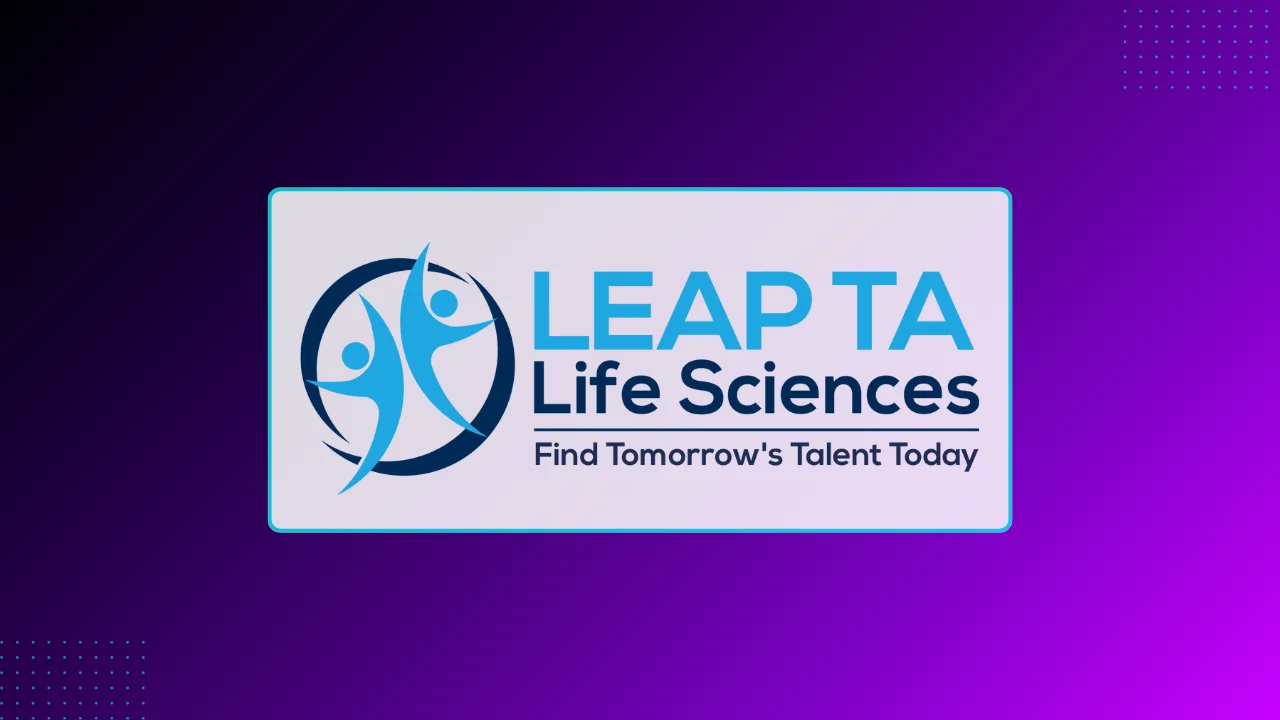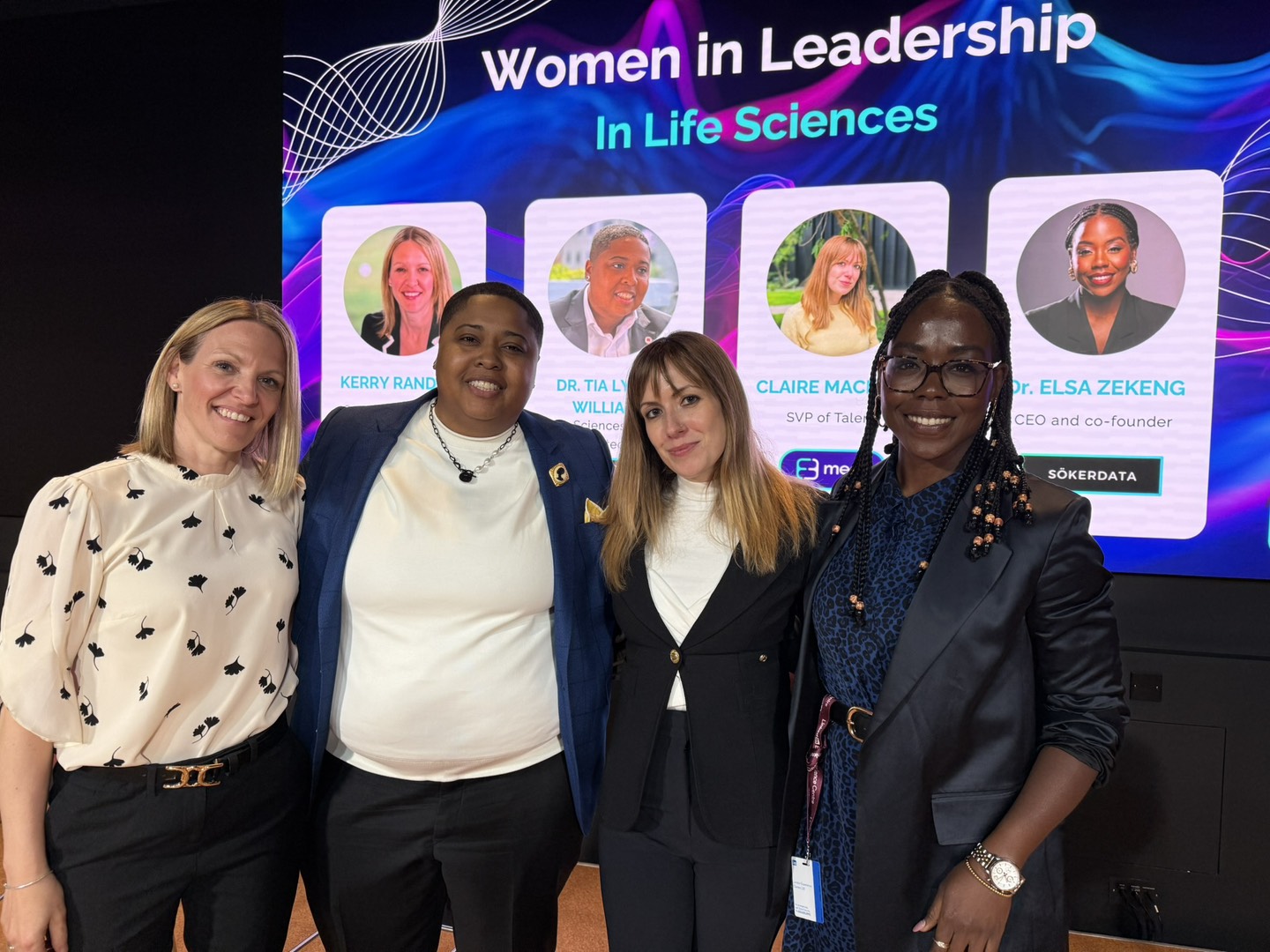
4 Key Takeaways: Meet’s Women in Leadership Event
20 May, 20256-7 minutes
On the 8th of May, we had the pleasure of hosting our first ever in-person industry networking event: Women in Leadership in Life Sciences!
If you joined us at LinkedIn’s brand-new experience center in central London, thank you so much for attending. Your presence undoubtably contributed to the afternoon being such a success. In fact, every single person who attended added to the important discussions and thoughts shared surrounding the apparent gender imbalance in senior and C-suite roles in Life Sciences.
For those who couldn’t make it, we still appreciate your interest. Although you missed out on hearing from our speakers directly, there’s no need for FOMO. We’ll soon be uploading mini podcast episodes showcasing each of the talks. Plus, there’s always next time!
Our four brilliant keynote speakers included Kerry Randall (SVP of IQVIA), Dr. Tia Lyles-Williams (Biotech Exec & 3x Life Sciences founder), Dr. Elsa Zekeng (scientist turned entrepreneur and CEO) and our very own SVP of Talent, Clair MacLeod. As well as sharing their stories and celebrating women in leadership, they had some poignant words of advice about closing the leadership gap for everyone in the room – whether they were just starting out in their careers, about to move into leadership or already within a leadership position.
Each of their talks have been uploaded in full to LinkedIn, if you'd like to access them below:
1. Claire’s stance on overcoming imposter syndrome
Claire was the first speaker to take to the stage. Her talk revolved around imposter syndrome and how it predominantly affects women at home but also in the workplace. She highlighted a poignant statistic from a recent KPMG report:
75% of female executives have experienced imposter syndrome at some point in their careers
While we know that everyone can feel like an imposter at times, women feel the burden of this phenomenon more so than their male counterparts. During their early childhood and upbringing, girls are often held to very high standards and ‘expected’ to be near perfect. When you combine this with their own self-doubt and the societal pressures that lead to second-guessing, feeling like an imposter can be threatening – especially to a woman’s career success.
Essentially, according to Claire, imposter syndrome acts as one of the barriers that prevents women from getting into VP and C-suite positions. And while she touched on a range of solutions for overcoming this, she homed in on the fact that the issue is both systemic and personal. Her last words of advice? If you can, try and see imposter syndrome as a moment of growth. Feeling like an imposter signals that you’re outside your comfort zone – which is a key sign that you’re on your way to reaching new accomplishments.
2. Kerry’s comments on The Bravery Deficit and the importance of steering girls away from perfectionism
Kerry was next and she spoke about The Bravery Deficit, which was coined by Reshma Saujani in a thought-provoking TED talk. To summarize, the bravery deficit refers to the way society teaches young girls growing up to achieve perfection while raising our boys to be brave. This causes a disparity where men generally aren’t afraid of failing first in order to achieve success, while women feel that failure isn’t an option and therefore are less likely to try new things.
A statistic that highlights the bravery deficit: when applying to jobs, men will generally click apply when they meet roughly 60% of the requirements – whereas women will only apply once they're sure they meet 100% of the requirements.
After explaining this, Kerry went on to share another statistic with us: even though women make up half of the workforce, only 20% of them are in C-suite positions. She then stated her belief that the bravery deficit is one of the factors contributing to this.
The truth is, for many women, the struggle between bravery and perfectionism is real. Kerry shared several stories from both her professional life and her role as a mum where she too battled with having the courage to outdo herself while remaining ‘perfect’. It truly spoke to so many of us in the audience.
So, what can we do to overcome this, when there are generations and generations of women who have been brought up a certain way?
Kerry left us with the notion that support is everything, especially in the form of mentors. In the workplace, having a mentor is incredibly important – and people in leadership can do so much simply by championing high-potential employees. By offering support and uplifting others to celebrate bravery and boldness (and to embrace mistakes!), we can work towards closing the leadership gap in Life Sciences.
3. Dr. Elsa on the importance of diversification in clinical trials
When Dr. Elsa took to the stage, her grace, composure and confidence radiated outwards immediately. Her talk began with a little but about her background, having been born and raised in Cameroon, before we learnt about her journey from researcher to entrepreneur.
Elsa created her company SökerData to tackle the data biases and lack of diversity within clinical trials. Drugs that make it onto the market are generally only tested on one particular demographic, meaning that people from diverse backgrounds are left with treatments that don’t work as effectively on them.
In a recent visit to Nigeria, where she planned to gauge better understanding of this lack of diversification within clinical trials, she saw the effects of this happen in real time. Numerous women were being diagnosed with stage 3 or 4 breast cancer, only to be left questioning why their treatments weren’t working, or if they’d even been given the correct drug in the first place. It was heartbreaking to witness.
One thing couldn’t be clearer: Drugs need to take everyone’s genetic code into consideration.
Dr. Elsa rounded things up with a beautiful note she’d written to herself titled If I die today. It involved feeling grateful for a number of things, from living without asking for permission to overcoming hurt and misunderstanding to finding your people and your power. It was incredibly touching, and, in all honesty, there wasn’t a dry eye in the room.
4. Dr. Tia: ‘Don’t wait for someone else’s permission to do what you want in life’
Dr. Tia was our final speaker and it’s safe to say she very much left us on a high note. Her charisma and sense of humor had us in stitches while she talked us through her career experiences and the reasons that eventually led her down the path of becoming a 3x Life Sciences founder and CEO.
After walking us through some of the highs and lows of her working life, including hiding behind trees post-interview to losing out on a job to a surfer dude in a full body cast, it became clear that she was facing hurdle after hurdle in the industry.
She’d had countless attempts at climbing the ladder. She was doing the work, proving she could do the work... and doing additional work (definitely above her pay grade!). And yet, the promotions didn’t come. The job was always given to someone else.
Eventually, she realized she had to take matters into her own hands. She became the first African American queer woman to own and lead a biopharmaceutical manufacturing company – Jackson Taylor Therapeutics. She then went on to found HelaPlex and sister company Lucas Pye Bio. The former is a co-working facility for commercial Life Sciences start-ups and virtual BioTech companies, and the latter is a Contract Development Manufacturing Organization (CDMO) with a primary focus of providing bioprocessing services below market price.
She also subtly added that, being an expert of CDMOs, she was invited into the White House back in 2022 where she participated as a panelist for Biotechnology and the Bioeconomy. Just another insanely cool accomplishment to add to the list!
Her closing words had a huge impact and were certainly something to remember: “If you guys are waiting for permission to do what you gotta do... what you want to go after... it’s not going to happen.” Women who want to be successful must advocate for themselves. And they must never be limited by other people’s limited expectations.
Ultimately, Tia did a wonderful job of inspiring everyone in the room and her remarkable character was not one to miss.
Overall, the event was a huge success – thanks to all our wonderful speakers and attendees. Thank you so much to everyone who joined us and contributed to all the important conversations that took place. Looking forward to bringing you more events in the future!
---
In 2023, we conducted our first women in leadership survey that explored the barriers women face when climbing the career ladder. With this data, we composed a whitepaper that highlighted the factors contributing to this disparity.
Two years on, we’re conducting another survey to see if anything has changed. If you’d like to contribute your thoughts (which will feature in our next whitepaper that’s due to be released this summer), please click here.


